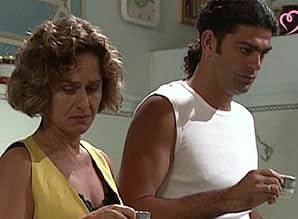Ajouter une intrigue dans votre langueA divorced mother makes the ultimate sacrifice to secure her daughter's happiness.A divorced mother makes the ultimate sacrifice to secure her daughter's happiness.A divorced mother makes the ultimate sacrifice to secure her daughter's happiness.
- Prix
- 13 victoires et 3 nominations au total
Parcourir les épisodes
Histoire
Le saviez-vous
- AnecdotesMother and daughter in real life, the opening sequence features real life photographs of Regina Duarte and Gabriela Duarte.
- ConnexionsFeatured in Banlieue 13 (2004)
Commentaire en vedette
The 90s were never as elegant as in "Por Amor." When I listen to the dialogues written by Manoel Carlos, I feel as if I'm listening to a symphony orchestra: each dialogue is carefully crafted to resonate with authenticity. If you expect action at the level of a drug dealer husband who dies and his wife taking his place, full of sex, drugs, people being buried alive, and constant in-your-face violence, this soap opera is not for you. Here, the realism of the narrative is what sets it apart; we have everyday people we interact with.
Who doesn't know a Branca Letícia (Susana Vieira)? Prejudiced, manipulative, cynical, and deceitful, she hides everything behind a smile and an enchanting charm that even makes the viewer doubt her evil in certain scenes. The protagonist is Helena Viana (Regina Duarte), who seems to be the author's favorite actress, as she has played more than one Helena in other telenovelas. There is no doubt: she does a beautiful job, being a woman with a lovely soul and appearance, who conquered her home and career, raising her daughter alone, welcoming and helping everyone around her without expecting anything in return. But don't think she is a perfect being: Helena has flaws, including loving her daughter Eduarda (Gabriela Duarte, her real-life daughter) too much, something she admits and which generates the main plot of the novela.
In the beginning, Eduarda is a very spoiled, insecure, arrogant girl and even malicious towards her half-sister Sandrinha (Cecíllia Dassi), the daughter of her father Orestes (Paulo José). She harbors resentment over unresolved issues from the past with her father and feels constantly pressured to have a child, who must not be a girl, to secure her marriage to Marcelo (Fábio Assunção), Branca's son. Marcelo is a macho, possessive, emotional, and jealous man, pressured by his mother, who manipulates everyone around her to do what she wants. It's beautiful to see the evolution of Eduarda and Marcelo, how Sandrinha brightens Eduarda's sad days like a pure and innocent angel, making her smile. Sandrinha also brings Orestes and Eduarda closer, something that seemed impossible.
The Soap opera is full of romantic stories and addresses prejudice, betrayal, racism, injustices, all flowing very naturally, nothing feels forced. I didn't feel the monotony some mention; I felt anguish, anger, rage, and disagreed with certain characters' actions. The novela is not perfect; it is imperfect, just like people in everyday life: a woman who goes back to her abusive husband, a lady who gets away with committing crimes, a husband who cheats on his wife and hides it, putting the blame on her when discovered, all this in a way that provokes reflection and empathy in the audience. All this with characters who know how to act and are there for their talent, especially the women: the unforgettable and chic Branca Letícia de Barros Motta, the impeccable Helena Viana who needs no praise, the talented Sandrinha Greco (a child who gives a show), and Eduarda Viana, who was criticized at the beginning but as the novela developed, grew on viewers and became one of the best characters. And because she is Helena's real-life daughter, it added a special touch to the relationship between the two characters, who express their mother-daughter love uniquely. And we can't forget all this with a bossa nova soundtrack, the setting in Leblon, with runs and walks along the beach promenade, and beautiful mansions, a common charm in Manoel Carlos's telenovelas. As a viewer, I forget about my life and even feel like living that reality.
"Por Amor" is a novela that does not seek to be extravagant or sensationalist. Instead, it focuses on the emotions and real dilemmas of everyday people, making the audience see themselves reflected in the stories presented. It is this authenticity that makes it a timeless classic, leaving viewers wanting more even after it ends.
Who doesn't know a Branca Letícia (Susana Vieira)? Prejudiced, manipulative, cynical, and deceitful, she hides everything behind a smile and an enchanting charm that even makes the viewer doubt her evil in certain scenes. The protagonist is Helena Viana (Regina Duarte), who seems to be the author's favorite actress, as she has played more than one Helena in other telenovelas. There is no doubt: she does a beautiful job, being a woman with a lovely soul and appearance, who conquered her home and career, raising her daughter alone, welcoming and helping everyone around her without expecting anything in return. But don't think she is a perfect being: Helena has flaws, including loving her daughter Eduarda (Gabriela Duarte, her real-life daughter) too much, something she admits and which generates the main plot of the novela.
In the beginning, Eduarda is a very spoiled, insecure, arrogant girl and even malicious towards her half-sister Sandrinha (Cecíllia Dassi), the daughter of her father Orestes (Paulo José). She harbors resentment over unresolved issues from the past with her father and feels constantly pressured to have a child, who must not be a girl, to secure her marriage to Marcelo (Fábio Assunção), Branca's son. Marcelo is a macho, possessive, emotional, and jealous man, pressured by his mother, who manipulates everyone around her to do what she wants. It's beautiful to see the evolution of Eduarda and Marcelo, how Sandrinha brightens Eduarda's sad days like a pure and innocent angel, making her smile. Sandrinha also brings Orestes and Eduarda closer, something that seemed impossible.
The Soap opera is full of romantic stories and addresses prejudice, betrayal, racism, injustices, all flowing very naturally, nothing feels forced. I didn't feel the monotony some mention; I felt anguish, anger, rage, and disagreed with certain characters' actions. The novela is not perfect; it is imperfect, just like people in everyday life: a woman who goes back to her abusive husband, a lady who gets away with committing crimes, a husband who cheats on his wife and hides it, putting the blame on her when discovered, all this in a way that provokes reflection and empathy in the audience. All this with characters who know how to act and are there for their talent, especially the women: the unforgettable and chic Branca Letícia de Barros Motta, the impeccable Helena Viana who needs no praise, the talented Sandrinha Greco (a child who gives a show), and Eduarda Viana, who was criticized at the beginning but as the novela developed, grew on viewers and became one of the best characters. And because she is Helena's real-life daughter, it added a special touch to the relationship between the two characters, who express their mother-daughter love uniquely. And we can't forget all this with a bossa nova soundtrack, the setting in Leblon, with runs and walks along the beach promenade, and beautiful mansions, a common charm in Manoel Carlos's telenovelas. As a viewer, I forget about my life and even feel like living that reality.
"Por Amor" is a novela that does not seek to be extravagant or sensationalist. Instead, it focuses on the emotions and real dilemmas of everyday people, making the audience see themselves reflected in the stories presented. It is this authenticity that makes it a timeless classic, leaving viewers wanting more even after it ends.
- marcelocostabertallia
- 20 juin 2024
- Lien permanent
Meilleurs choix
Connectez-vous pour évaluer et surveiller les recommandations personnalisées
- How many seasons does Por Amor have?Propulsé par Alexa
Détails
Contribuer à cette page
Suggérer une modification ou ajouter du contenu manquant















